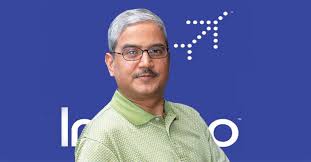 Image Source: The Economic Times
Image Source: The Economic Times
In a strategic move that marks another chapter in his gradual exit from India’s largest airline, billionaire Rakesh Gangwal has raised $501 million through a downsized stake sale in InterGlobe Aviation Ltd, the parent company of IndiGo Airlines. The transaction, executed via block deals, reflects Gangwal’s continued efforts to pare down his holdings in the airline he co-founded nearly two decades ago.
The sale, which was originally expected to raise up to $801 million, was scaled back due to market conditions and investor appetite. According to reports, Gangwal and his Chinkerpoo Family Trust offloaded approximately 3.1% of IndiGo’s equity, amounting to 12.1 million shares, at a floor price of ₹5,808 per share—nearly 4% below the stock’s closing price of ₹6,050 on the National Stock Exchange2.
Despite the markdown, the deal was well-received by institutional investors, with Goldman Sachs, Morgan Stanley, and JPMorgan acting as lead bankers. The transaction underscores the growing interest in India’s aviation sector, which has seen a post-pandemic resurgence amid rising passenger traffic and expanding fleet capacity.
Gangwal’s Exit Strategy: A Long-Term Unwinding
Gangwal’s stake sale is part of a broader plan to gradually exit the airline business. Since resigning from IndiGo’s board in 2022, he has sold off significant portions of his holdings. At the time of his resignation, Gangwal and his family held nearly 37% of InterGlobe Aviation. Following this latest sale, his direct ownership has dropped to 4.71%, while co-promoter Rahul Bhatia retains 35.73%.
This marks Gangwal’s seventh stake sale since 2022, with previous deals including a $1.36 billion sale in May 2025 and two 5.83% stake sales in 2024. The family has agreed to a 150-day lock-up period on further share sales, signaling a temporary pause in the divestment spree3.
Market Reaction: IndiGo Shares Hold Steady
Despite the discounted sale price, IndiGo’s stock remained resilient. Analysts attribute this to the airline’s dominant market position—holding a 64% share of India’s aviation market—and its strong fundamentals. The company reported ₹21,543 crore in revenue for the June quarter, up 6% year-on-year, although profits dipped 20% to ₹2,176 crore due to geopolitical disruptions and seasonal travel declines.
IndiGo’s available seat kilometers (ASK), a key metric of capacity, rose 16% to 42.3 billion, indicating aggressive expansion. The airline’s share price has tripled over the past three-and-a-half years, rising from ₹1,807 in March 2022 to ₹6,045 in August 2025.
Strategic Implications: What’s Next for IndiGo?
Gangwal’s exit raises questions about the future governance and strategic direction of IndiGo. The long-standing feud between Gangwal and Bhatia, which became public in 2019 over corporate governance concerns, has largely subsided. However, the departure of one of its founding architects leaves Bhatia with greater control and responsibility.
Industry observers believe that IndiGo is well-positioned to capitalize on India’s booming aviation market, which is projected to require 30,000 new pilots over the next two decades. The airline is also investing in training infrastructure, with a new pilot training center set to open in Mumbai in early 2026.
Final Thoughts: A Billionaire’s Quiet Departure
Gangwal’s latest stake sale may be downsized, but it’s far from insignificant. It reflects a calculated retreat from the airline industry, executed with precision and timing. For investors, it’s a reminder of the dynamism in India’s aviation sector—and the opportunities that lie ahead as the skies get busier and the competition intensifies.
Sources: Livemint, News18, Brinks Report
Advertisement
Advertisement



